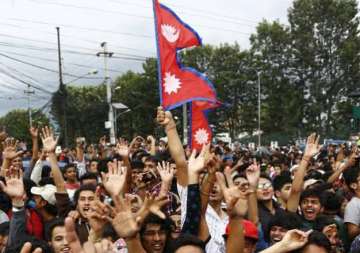Nepal gets new secular Constitution amid protests
Kathmandu: Nepal today adopted a historic Constitution after seven years of painstaking deliberations marking its transition into a fully secular and democratic republic from a Hindu monarchy, amid violence by minority Madhesi groups over a

Kathmandu: Nepal today adopted a historic Constitution after seven years of painstaking deliberations marking its transition into a fully secular and democratic republic from a Hindu monarchy, amid violence by minority Madhesi groups over a seven province federal structure.
"I announce the presented constitution of Nepal, passed by the Constituent Assembly and authenticated by the chairman of the Constituent Assembly, effective from today, 20 September 2015, before the people of Nepal," President Ram Baran Yadav said as he unveiled the statute in Parliament.
"I call for unity and cooperation of all at this historic moment," he said at the special ceremony at the Constituent Assembly (CA) hall in Naya Baneshwor amid sporadic violence reported from southern areas bordering India where the minority Madhesi community is opposed to the idea of dividing the country into seven federal provinces.
National flags soared high and firecrackers went off as thousands of Nepalese thronged the streets to mark the Himalayan nation's transformation into a secular, federal democracy from a Hindu monarchy. They also gathered in front of the Constituent Assembly hall in large numbers.
There were processions at different places of Kathmandu to celebrate the occasion, with people decorating streets and lighting candles with excitement of their own Constitution -the first to be drafted by elected representatives - after a 67 year-long democratic struggle.
The President added: "The Constitution is the common document of all of us to protect our freedom, independence, geographic integrity, and sovereignty in people." With this the Interim Constitution has been annulled.
President Yadav said the newly promulgated 'Constitution 2072' has institutionalised republicanism in the nation. He expressed hope that the Constitution would bring peace and stability in the country and pave way for economic development and prosperity.
"People have fought nearly for seven decade for democracy and lasting peace," he added.
The new Constitution has given an opportunity to maintain unity in diversity in the nation and ensure rights of all, he added, while addressing the final meeting of the CA as the Assembly unanimously endorsed an acknowledgement motion, thanking the President for announcing commencement of the statute.
It has been endorsed by 85 per cent of the 601 members of the CA and has the provision of a bicameral legislation.
The Lower House or the House of Representatives will have 375 members and the Upper House has 60 members.
The Constitution has 37 divisions, 304 articles and 7 annexes. The seven provinces will be finalised by a high-level commission within a year.
Today's historic moment came amid protests by Madhesi groups over the issue of federating the country.
Also Read: Nepal steps up security ahead of constitution proclamation
Violence surrounding the federal structure that will divide the country into seven provinces has triggered violence in the Himalayan nation, claiming at least 40 lives including one reported today.
Reports of protests and vandalism poured in from some southern Nepal districts as President Yadav announced the new Constitution.
There were both pro-constitution and anti-constitution rallies and sporadic clashes in Biratnagar, Birgunj, Dharan and Sarlahi in southern and eastern Nepal. In Siraha, the
Madhesi Front cadres set on fire the house of a Nepali Congress lawmaker.
In Birgunj, one person was killed in police firing while the protestors vandalised the house belonging to a CPN-UML lawmaker.
Security was beefed up in the wake of the agitation, including a large number of security personnel deployed at the CA hall.
Madhesis and the Tharu ethnic communities in southern Nepal and some western districts are opposed to the new Constitution as they believe it has failed to address concerns
raised by the Madhesis and the Tharu ethnic communities.
India, that sent Foreign Secretary S Jaishankar as Prime Minister Narendra Modi's special envoy to urge top Nepalese leadership to address concerns of all sides, had expressed concern over the ongoing violence.
Promulgation of the statute should be an occasion of joy and not violence, Jaishankar said yesterday, a day before the unveiling of the new statute following protests that has spilled over to districts bordering India.
Earlier, a bomb threat was sounded in two places of Lalitpur district, adjoining Kathmandu, but the suspicious objects were found to be hoax, police said.
Yesterday, Prime Minister Sushil Koirala appealed to the agitating Madhesi and Tharu groups to withdraw their agitation and come forward for dialogue, saying the outlet to all problems can be found through agreement and co-work.